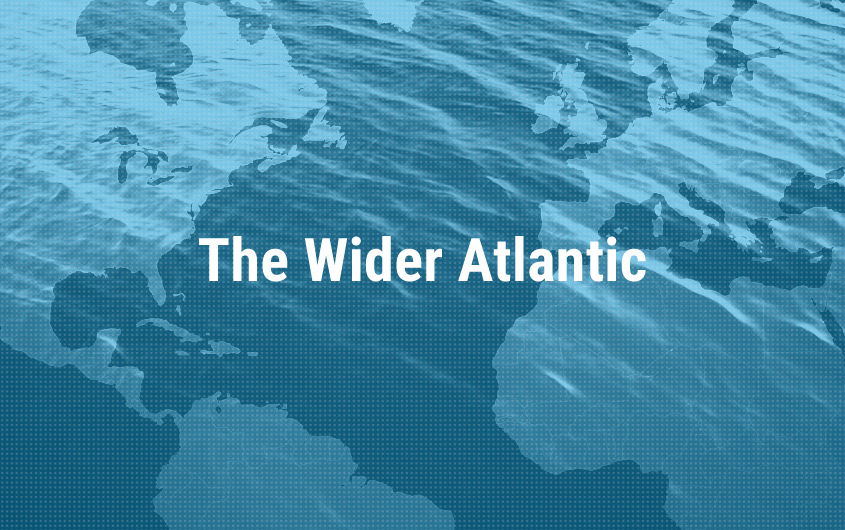
Voting for the Eurozone on September 24th

Peter S. Rashish
Vice President; Director, Geoeconomics Program
Peter S. Rashish, who counts over 30 years of experience counseling corporations, think tanks, foundations, and international organizations on transatlantic trade and economic strategy, is Vice President and Director of the Geoeconomics Program at AICGS. He also writes The Wider Atlantic blog.
Mr. Rashish has served as Vice President for Europe and Eurasia at the U.S. Chamber of Commerce, where he spearheaded the Chamber’s advocacy ahead of the launch of the Transatlantic Trade and Investment Partnership. Previously, Mr. Rashish was a Senior Advisor for Europe at McLarty Associates, Executive Vice President of the European Institute, and a staff member and consultant at the International Energy Agency, the World Bank, UN Trade and Development, the Atlantic Council, the Bertelsmann Foundation, and the German Marshall Fund.
Mr. Rashish has testified before the House Financial Services Subcommittee on International Monetary Policy and Trade and the House Foreign Affairs Subcommittee on Europe and Eurasia and has advised three U.S. presidential campaigns. He has been a featured speaker at the Munich Security Conference, the Aspen Ideas Festival, and the European Forum Alpbach and is a member of the Board of Directors of the Jean Monnet Institute in Paris and a Senior Advisor to the European Policy Centre in Brussels. His commentaries have been published in The New York Times, the Financial Times, The Wall Street Journal, Foreign Policy, and The National Interest, and he has appeared on PBS, CNBC, CNN, NPR, and the BBC.
He earned a BA from Harvard College and an MPhil in international relations from Oxford University. He speaks French, German, Italian, and Spanish.
The German elections are just over two weeks away on September 24. Chancellor Angela Merkel is nearly certain to be reelected to a fourth term, so the main unknown surrounds her choice of coalition partner(s). Will it be another grand coalition with the left-of-center Social Democrats (the SPD may wish some time in opposition), two-party rule by Merkel’s Christian Democrats and the centrist, pro-business Free Democratic Party (if the numbers are there), or even a three-way coalition consisting of Merkel’s party, the Free Democrats, and the Greens (intriguing)?
If you are an American, you might think the most important economic issue at stake in this electoral contest is whether during Chancellor Merkel’s next (and probably last) term the Germans will finally reduce their trade surplus with the United States. That’s because the president and some of his cabinet officials have not been shy about pointing to “unfair” deficits with Germany and other leading trading partners as one cause of sub-par U.S. economic growth.
It is important not to get distracted by this phony war over the U.S. trade deficit with Germany. The U.S. could try to eliminate deficits with every country it trades with, but so long as the country needs to import savings from abroad to make up for the shortfall at home it is going to run a deficit with someone.
No, there is only one economic issue in the German election that really matters for the United States: the future of the eurozone. A look back at the financial crisis that marks its 10th anniversary this summer helps to understand why. While the crisis may have been ignited by a lack of confidence in the U.S. sub-prime mortgage market, and reached a boiling point with the bankruptcy of the U.S investment firm Lehman Brothers, it became a geopolitical issue once it reached Europe.
The half-way house institutions of the eurozone—monetary union without financial union—were severely tested by the scale of the disruption. European and national politicians and officials ultimately rose to the task, building the proverbial firehouse once the neighborhood had already caught fire. But there was and there remains understandable concern that an economic crisis of that magnitude could not only break apart the euro—bad enough in itself—but also endanger the wider European Union, which is a key building block of the global economic order.
Once the constraints of the German election campaign are out of the way, there are many steps the eurozone could take to both strengthen its resilience to shocks and promote more dynamic economic growth: creating a European Monetary Fund to help countries with short-term financial difficulties and to promote investment; issuing a safe asset akin to a U.S. Treasury bond to increase liquidity in financial markets; moving to a pan-European capital market; harmonizing the approach to troubled banks; and building an EU-wide deposit insurance scheme. The political landscape is favorable: France’s new president Emmanuel Macron and Germany’s Merkel have publicly agreed on some of these measures, although not all.
There is another thing the eurozone could do. Given that the eurozone’s 19 member countries share a currency and are aiming to create even deeper forms of integration, trade deficits and surpluses among them are not “external” in the same the way they are between the U.S. and Germany. The surpluses that Germany and a few other countries run with slower-growing countries that use the euro impact the eurozone’s overall economic performance and stability, making that an in-group rather than an outsider issue. Germany may resist, but it needs to help find a way to reduce these imbalances.








